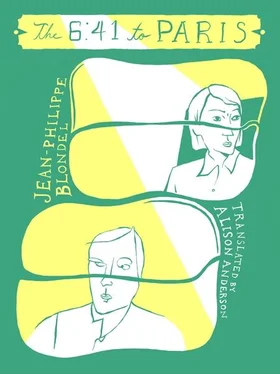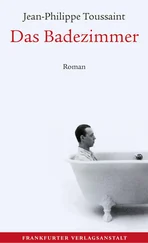So here I am.
Whatever Cécile Duffaut might think, I’m very loyal. It’s probably my best quality: for anyone I get attached to, or who gets attached to me, I’m like a dog. It’s not a very sexy trait, I’ll grant you that. It’s not the sort of thing you can let slip in conversation, when you meet someone. “You know, I’m very loyal”: you might as well tell them that you collect ceramic owls or that you spend your Sunday afternoons in front of the TV.
Cécile Duffaut doesn’t give a damn. She doesn’t give a damn about what I just told her.
At the same time, I can hardly say I blame her. It was twenty-seven years ago. A whole lifetime has gone by since then. There’s no point talking about it anymore. Or apologizing.
Thank God the trip will be over soon.
Sorry.
It was kind of him to say it.
To say he was sorry.
And I said, thank you.
How stupid.
Either you say nothing, and you cloak yourself in your dignity, you cast a scornful look at the odious individual who has dared to speak to you; or you accept the apology and you continue the conversation, Oh, and how are you after all these years, are you married, do you have kids, where do you work, well, you see, you made your way after all.
But like an imbecile, I dithered, somewhere in between.
I suppose that’s just the way I react to him — I’m indecisive, half stunned, half annoyed, incapable of deciding anything until the facts shove me out the door. Off the train. Out of the hotel room.
Why am I hung up on the past when I should be forging ahead, elated, looking forward to whatever’s in store? That’s how things were until last year. But now some spring has lost its tension; there’s some mechanism that hasn’t seized up yet, but it’s creaking. It’s harder to stifle those yawns in the morning. Valentine is almost seventeen, and she’s slipping away — and with her, the strongest tie I have with Luc. I wonder what will be left of our relationship once our daughter has left home. Maybe we’ll just congratulate each other, with kisses on both cheeks: “You did good with the kid, we can be proud, I’m off now, ciao,” and go our separate ways without any other due process, because for a long time now we haven’t exactly known who we are to each other, what we like, what we want. Or we’ll go on living together, like mussels on a rock, waiting for the next tide.
Balance sheet.
Settling of accounts.
That’s what I’ve been going over these last few months.
My life, two columns: pluses and minuses.
This I like / this I don’t like.
Make lists of what you like / what bothers you.
I sound like an article in a woman’s magazine.
I hate that sort of thing.
My father was a genealogy fanatic.
It started when he was about forty-five; I was still at the lycée. He would spend his vacations writing letters, making phone calls, going from one town hall to the next to look at birth registries. I was laughing behind his back. I couldn’t have been happier. While he was busy doing that he was off my case, and I was free to come and go as I pleased. Otherwise he’d spend all day telling me to “go out for some air,” or “do something intelligent.” I still don’t understand what he meant by that, coming from him, a man who didn’t read or listen to music and who’d never set foot in a museum. For him intelligent was probably a synonym for useful: housework, mending, shopping.
This lasted until his retirement; I thought he’d have something to keep him busy once he stopped work, that he’d continue to pursue his passion, go all the way back to the sixteenth century, fill in his family trees. But all of a sudden he lost interest. The family trees must be in some dusty corner of the attic.
I’ve never been like him. I’ve never wanted to pore over registries of births, deaths, and marriages just to find out that one of my ancestors was a blacksmith. I’m much more down to earth than that. Now things have changed somewhat. We have, imperceptibly, grown closer. Just as everything has begun to take off professionally for me — we’re opening new stores, the business is booming — I’ve begun to feel a sort of weariness. All I want to do, in fact, is sit in a deck chair on an evening in June and start to drop off right there, just as the night is falling, and I’ll be vaguely trying to remember the names of the stars above me. The way he used to. One day, perhaps, we’ll be able to name them together. At last.
I wonder if Philippe has any aspirations. Probably not. Philippe isn’t the aspiring kind. He seizes the moment and consequences be damned. He must cheat on his wife, and his kids will think he’s a hero, what with the pointless but entertaining conversations I’m sure they have together.
What if I dare to look him right in the face.
My eyes trained right on him.
Deep, unattractive wrinkles. His hair beginning to thin. And that paunch, above all. I assumed, naïvely, that he would stay slim as he got old. That he’d be one of those crisp fiftysomething men who go running every Sunday and don’t put on an ounce of fat even when they give up smoking. Like Luc. Or like that friend of his, Mathieu Coché. Now there’s a good-looking man. Good-looking, and not such an unpleasant memory in the end. Maybe I could start with that. A benign conversation, now that the train has stopped for a few minutes before it pulls into the station: we can see Sacré-Coeur on the right, and the Cité des Sciences on the left. An empty conversation of the kind he must enjoy, and which would at least have the advantage of not letting our non-encounter end on the unpleasant note of an unconfirmed request for forgiveness. Something like, “I saw your friend Mathieu Coché in a magazine the other day.” His eyes would light up. Even if they haven’t seen each other in ages. It’s always nice to have a friend who’s famous. It makes your own star shine a little brighter.
Yes, I could try that. Two minutes exchanging bland information, and we would say good-bye with a smile.
I’ll be magnanimous.
I need my peace of mind.
We regret to inform our passengers that the train is currently stopped on the tracks and we ask that you do not try to open the doors. The train will be moving again shortly.
Grumbling and muttering up and down the train.
Sighs.
“Shit, we were almost there. That’s the SNCF for you.”
Or the SNCF, maybe.
A stock phrase like the one the guy in front of me just said: “That’s the SNCF for you.” Everyone is nodding and grumbling. Everyone complains about the SNCF, in a spirit of consensus, criticizing everyone and no one at the same time, and it gives us plenty of excuses for being in a bad mood, it’s manna from heaven for those who firmly believe the country is going to the dogs, that everything was better before, and now we’re in the gutter about to be washed down the drain, splash.
I had a bad taste in my mouth.
But the SNCF would still be a good way to try and break the ice. Let her fly off the handle and rant and rave if she needs to. At least so we don’t part on an unpleasant note.
Make small talk.
I would love to make small talk with Cécile Duffaut. At a sidewalk café overlooking the Canal Saint-Martin, or on the Boulevard Saint-Germain.
Before or after the hospital.
After would be better. To get my life back to normal. Yes, that’s it. To get my life back to normal.
“I saw your—”
“The SNCF is—”
“I’m sorry, what were you saying?”
“Excuse me, I interrupted—”
A blank.
Читать дальше












